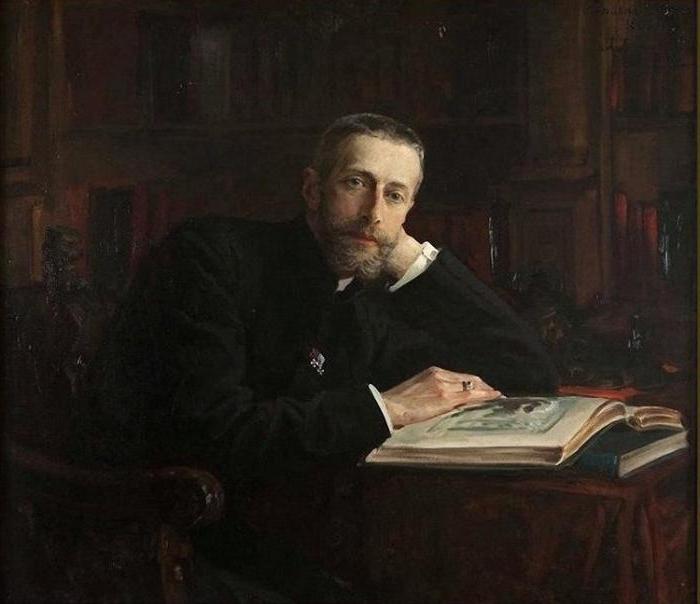Oddly enough, since the 19th century there were no Russian people on the Russian throne. There were Germans who married most often German princesses. The Grand Duke Konstantin Romanov (1858-1915) was no exception.
Childhood
In the family of Konstantin Nikolaevich and Alexandra Iosifovna (a princess from the city of Altenburg), a second son was born in August 1858, who was named Konstantin. He was immediately awarded high orders and enrolled in various regiments.
Fine manners were not required to be instilled - they were imbibed with the treatment of all kinds of teachers with him, at first a nanny of every kind, and then the teachers who gave him a home education. History was taught to him by our best historians, literature - the color of our literature - I.A. Goncharov and F.M. Dostoevsky.
Konstantin Romanov was well versed in music thanks to his brilliant theoretical and practical education in this field. But they prepared him according to family tradition for maritime service. He seriously studied under the program of the Maritime College.
Youth
Having served as a midshipman in the Svetlana frigate since the age of 16, Konstantin Romanov made a two-year voyage across the Atlantic Ocean and the Mediterranean Sea, and then passed the exam and received the rank of midshipman. He also participated in the war of 1877-1878 between Russia and the Ottoman Empire and received an award for the valiant service - the Order of St. George 4 degrees. At this time, he had already begun to write poetry. Further, his ranks increased, but later, in 1882, he was transferred to the land department and, having received leave in 1883, met the sixteen-year-old Princess Elizabeth, who in a year would become his wife. The poet dedicated lyrical lines to her, in which the moon shone, and the nightingale was filled with song, and inspiration came.

The wedding took place in 1884. Being 9 years older, the husband wanted to raise from a young girl a fan of lyric poetry and music, but Elizaveta Mavrikievna, diligently studying Russian and loving her husband, was a dozen women. She did not become spiritually close to her poetic spouse. She was interested in palace news, gossip with him. A young couple lived in Strelna, in the Marble Palace. They had six sons and three daughters, and the young woman found her vocation in raising children, without having found common ground with her husband.
Mature years
The wife of his cousin and friend, later the Governor-General of Moscow, turned out to be spiritually close to the august poet. Brother very subtly appreciated the gift of Constantine and supported him in this field. Four poems were dedicated to Sergey Alexandrovich, and his wife Konstantin Romanov selflessly admired his wife Elizabeth, dedicating her soulful lines in which there was a delight in her perfection.

She was beautiful both mentally and outwardly. Her fate will end tragically with the three sons of Constantine. They will die, thrown alive into a mine in Alapaevsk in 1918. But this is all in the distant future, but for now, the eldest son, Prince Romanov, writes a gentle lullaby. Despite his poetic gift and desire to surrender to him in full, Konstantin Konstantinovich Romanov served in the glory of the Motherland, wherever he was placed. He was anxious about the debt that fell to his lot. Royal blood flowed in his veins, and he was a minion of fate, as he himself wrote, and faithfully and honestly served the three emperors under whom his life passed - to Alexander II, Alexander III and Nicholas II.
Poems by Konstantin Romanov
Of course, they cannot be attributed to the heights of our poetry, but the poet possessed a lyrical gift and taste. In thoughtfulness, he could leaf through new collections of poetry lines by Fet and family albums.

In the photo - Konstantin Romanov, resting from business affairs. And he began to write poetry early, and when he was 24 years old, his first poems under the pseudonym K.R. He handed out the collection to friends, relatives and acquaintances. It was impossible for a member of the reigning house to subscribe in full name, but everyone knew who was the author of poetry collections with modest initials K.R. Versatile, he wrote critical articles and historical drama, made a translation of Hamlet with commentaries, to which he devoted ten years of his life. And his numerous lyrical miniatures served as a source of inspiration to our best composers. A special relationship has developed with P. I. Tchaikovsky, who dedicated the opera Oprichnik and the Second String Quartet to Prince Konstantin. Tchaikovsky’s romances - there are four of them - to the words of K.R. are in the repertoire of our best performers. Often meeting with Prince Konstantin, Tchaikovsky characterized him as a charming person. Appreciated by Tchaikovsky and his musical talent, intelligence and modesty. Konstantin Romanov himself wrote romances to verses by V. Hugo, A.K. Tolstoy,
A. Maykov.Conclusion
As if anticipating the trials that would be sent to him and his family, 15 years before his death, he wrote, "When there is no urine to bear the cross ...", hoping that the Lord will have mercy on everyone and give both mercy and love. But the Grand Duke himself died without surviving the death of his son Oleg in the fields of World War II, at the age of 56. And the family partially died near Yekaterinburg, partially got into emigration after 1917.